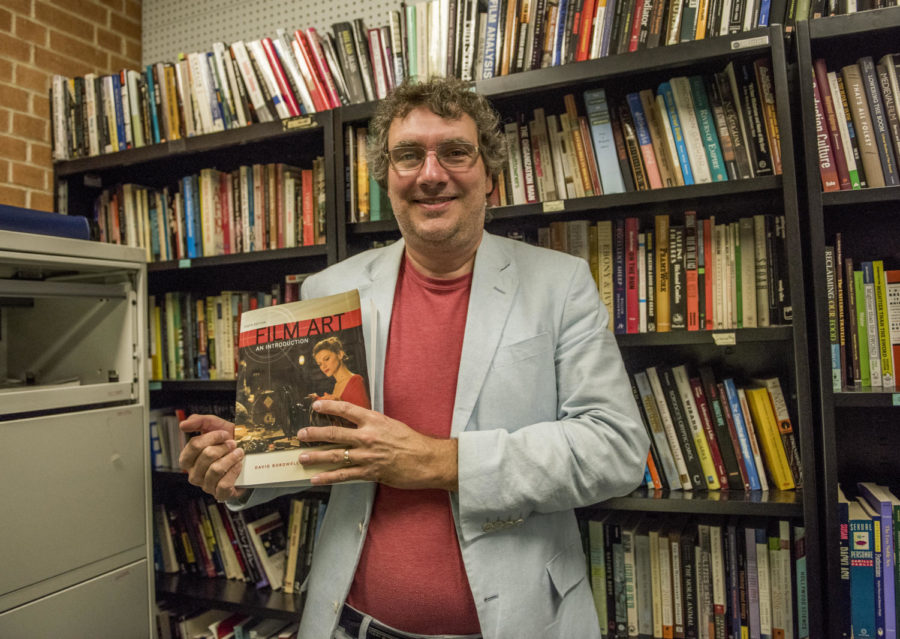Film professor hopes to impart ‘intensely humanist’ aspects of movies on students
Professor of cinema and photography Walter Metz is pictured Wednesday, Oct. 31, 2017, in his office in the Communications Building. (Dylan Nelson | @DylanNelson99)
November 1, 2017
Though in his teenage years he always thought he would be an engineer like his father before him, in college Walter Metz discovered his true passion is in film.
Metz, now a film professor, said he was always steered toward science and math classes throughout his adolescence.
“Really smart kids in high school are pushed into STEM disciplines because all the [Advanced Placement] classes are in STEM disciplines and not humanities discipline,” Metz said. “So [film] was never an option to me; I didn’t even know there were other jobs that weren’t STEM jobs.”
Advertisement
When Metz was in his second year of college at the Massachusetts Institute of Technology, he realized teaching was an option.
“I was sitting in … a renaissance history class and I looked at my teacher in the class and I said, ‘He reads books for a living,” which I didn’t know was a job.” Metz said. “I said, ‘I want to be like that guy.’”
Metz said his dad wouldn’t continue paying for his school unless he continued on as an engineering student, so he compromised by double majoring in film and engineering.
Once he graduated, Metz said he received a job in the semiconductor industry but decided instead to complete a master’s at the University of Iowa to fulfill his dream of becoming a professor.
“When I started doing it, it was for selfish reasons,” Metz said. “Reading books all day, writing, inventing new ideas about humanities — once I started teaching, which I started right away … I discovered that I loved it, which was a huge surprise to me.
The most rewarding aspect of teaching is “transforming student lives,” Metz said.
“You get a lot of students coming to college not knowing what they want to do with their lives,” Metz said. “What I tell them is that you have to do things that you’re passionate about.”
Advertisement*
Metz, a self-professed difficult grader, said he also tries to prepare students by keeping academic standards high.
“What I tell students is, ‘If you can get an A, or a B, or even a C in one of my classes, you’ll do well in your other classes and you’ll do well in life,’ because one thing I teach students how to do is study really hard,” he said.
Regardless of the field students eventually go into, Metz said being held to rigorous standards now will only help them in their futures.
“I don’t care whether they go to become a realtor, a business person or whether they go to work at a radio station, one’s boss is always going to give you assignments that you have to do on time, that you have to do well, under incredibly stressful conditions,” Metz said. “So the kind of teaching that I do can, if the student engages with it, really transform their skills.”
This semester, Metz is teaching a class on Islamic cinema, which he said he chose to do because of the ways in which Islam is represented by the media.
“The most complex cinema tradition in the Islamic world is Iranian cinema, and of course all you hear about Iran is that they’re making nuclear bombs to blow up Israel,” Metz said. “But Iranian cinema is actually beautiful, humanist cinema made by real human beings who aren’t trying to blow up Israel.”
Metz said one of the great things about film is how much it can teach an audience about a culture or lifestyle they have no experience with.
“Movies are intensely humanist operations,” Metz said. “They tell stories about people, and a bunch of those people are very different from you. Movies, when they’re properly functioning, build community.”
This, Metz said, is the “civic function” of movies — to expose viewers to new perspectives.
“When I was a kid, everyone read newspapers,” Metz said. “But now that people have been getting incredibly selected information. Your Facebook feed doesn’t look like my Facebook feed because it’s matching what it thinks you want, so essentially it’s just reinforcing what you already think about the world. We’ve lost any kind of civic organization.”
Though he is well-versed in film criticism, Metz said he stays away from actual filmmaking.
“I always say to students, ‘I make the world worse when I pick up a camera,’” Metz said. “My hand is always on the zoom lens, and the kinds of footage I tend to shoot … tends to make people sick because I’m on the zoom lens all the time.”
H.J. Lee, a teaching assistant in Metz’s contemporary media class, said Metz is a good scholar with attention to detail.
“He always tries to make some point between film and other media,” Lee said.
Others say it’s obvious in Metz’s classes that he loves what he teaches.
“It’s a historical approach, but at the same time it analyzes the principles of photography and teaches the students to think outside of the box,” said Gavin Glass, a junior studying cinema and photography.
Giovanni Galindo, a junior studying cinema and photography who took Metz’s media studies and photo class, said Metz takes analysis to levels other professors don’t.
“He literally shows us some of the earliest photographs ever, where to our eyes it’s basically a black screen, and he finds some deep way to analyze and say how its awesome,” Galindo said.
When students finish a semester in one of his classes, Metz said he hopes he’s made a lasting impression.
“I’m hoping they’re on kind of a lifelong trajectory of watching movies in a different before they encountered me,” Metz said. “But there’s no real magic trick. It’s a lot of practicing writing things, watching things and coming up with new ideas about what you’re seeing.”
Staff writer Kitt Fresa can be reached at kfresa@dailyegyptian.com or on Twitter @kittfresa.
To stay up to date with all your southern Illinois news, follow the Daily Egyptian on Facebook and Twitter.
Advertisement









